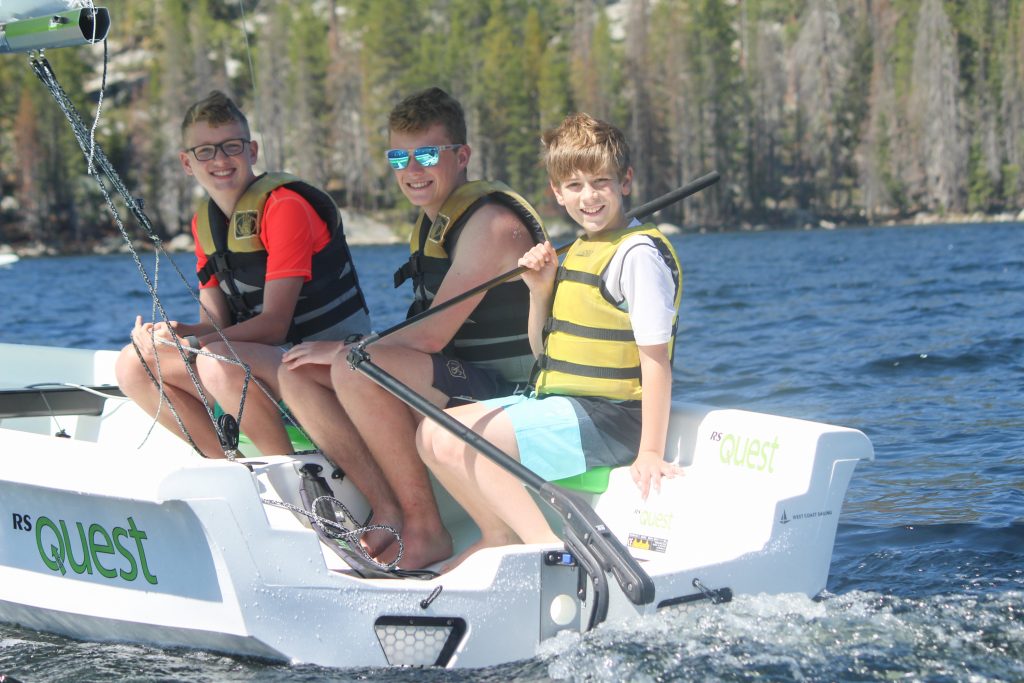Take A Hike Day – November 17th!
Celebrate National Take A Hike Day With GAC!
We’re obviously big fans of getting out into nature and taking a hike. At camp, campers participate in hikes of all lengths, from our Bears Adventure, to 8-mile overnight backpacking trips, to our 7 night teen Outdoor Leadership Course.
November 17th is National Take a Hike Day. Although the date falls in the middle of the week this year, plan to spend some time that day to at least take a short hike! Just use the hashtag #NationalTakeAHikeDay and tag us (@goldarrowcamp) on social media. We just might share our favorite hiking pictures!
4 Reasons For 2 Weeks
“Do you have a one week session?” is one of the questions we often get asked by parents who are new to our program. The question is usually preceded or followed by the comment, “Two weeks is too long for my child.”
I thought it would be helpful to outline for new parents why Gold Arrow Camp has a two-week session length as our primary camp offering. Although we also offer one-week Mini Camp programs at the end of the summer, Gold Arrow Camp’s core program is a two-week session, and that is the length of time the majority of our campers attend camp. We also have campers who are “Monthers,” who attend four weeks of camp by combining two, two-week sessions.
There are many benefits to camp, regardless of length of stay, as per this American Camp Association study. So, I urge you to find a camp that fits your family’s needs and schedule, even if Gold Arrow is not the best fit for you.
Our program, up until the 1970s, was a month-long program. Many traditional, East Coast camps still offer only one 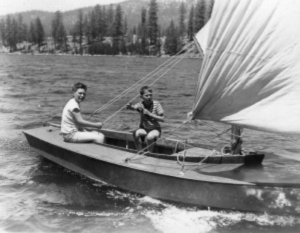 seven or eight-week session. To people in the West, this sounds crazy, as most programs on our side of the country are one-week in length. However, families who have been part of Gold Arrow and other traditional camp programs understand the benefits of a longer camp stay.
seven or eight-week session. To people in the West, this sounds crazy, as most programs on our side of the country are one-week in length. However, families who have been part of Gold Arrow and other traditional camp programs understand the benefits of a longer camp stay.
Many traditional camps in California have started offering one-week programs because that’s what many parents think they want for their child. Fortunately, our camp families have kept our two-week sessions consistently full, so we will continue to offer what we consider the best length for our program.
Why does Gold Arrow Camp have two-week sessions?
Here are four reasons:
Community and Friendship Building
Breadth and Depth of Activities
Social Skill Development
Independence and Confidence Building
1. Community and Friendship Building
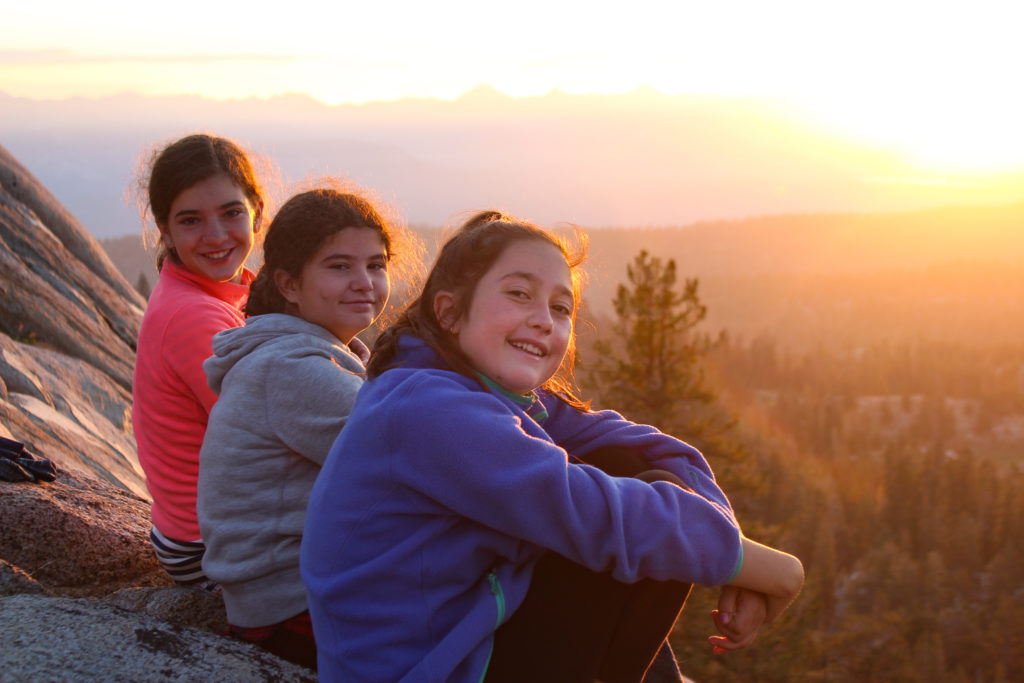
“My son has no fears about making friends at his new school because of the experiences he has at GAC. His self-confidence and outgoing nature are so nurtured at GAC that he feels prepared for anything!” – GAC Parent
While a lot of fun happens during even just one day of camp, spending more time connecting and building bonds with counselors, cabin mates, and other campers is one of the benefits of a two-week stay.
The first week of the session, there is an adjustment period for the first few days, when campers are getting settled and getting to know one another, the schedule, and the activities. By the middle of the first week, campers feel settled and comfortable at camp, and relationships have the opportunity to start getting deeper. Friendships, while they can definitely be formed in one week, have a better chance to grow stronger and deeper with more connection time.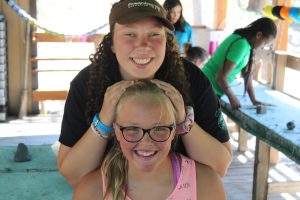
“My children lead busy lives during the school year with various teams and enrichment programs. Going to Gold Arrow Camp allows them to unwind and gain a new perspective on friendship, goals and life. From my perspective, GAC is summer the way it is supposed to be for kids. Thank you!!” – GAC Parent
Because all of the campers in the cabin group are at camp for the same length of time (two weeks), there are no departures and arrivals in the middle of the session to disrupt the group’s cohesiveness and the bonds that have developed. Everyone arrives together and departs together, with the exception of our Monther campers, who stay on for another session after their first two-weeks end.
2. Breadth and Depth of Activities
“My son came to Gold Arrow for the first time not knowing any of his cabin-mates. By the end of his two week session, he had made great friends and wanted me to ensure he could be in the same cabin with them next summer. He had a wonderful time at all the activities, but the stories he tells most are the ones involving fun with his new friends.” – GAC Parent
We take advantage of our location on Huntington Lake, in the heart of the Sierra National Forest, by teaching campers a large variety of water and land-based recreational activities. Many of our activities require extensive time and instruction. Sailing, as an example, is an activity that begins with a 2 ½ hour group lesson, and can be followed up by many additional lessons as campers opt for more sailing during Free Time. Without adequate time, it would be impossible for campers to even get to all of the activities we offer, let alone build skills in them. We want our campers to get exposure to all of what is offered at camp, and have the opportunity to pursue activities they are passionate about.
During their two weeks at Gold Arrow, campers have the opportunity to learn to sail, ride a horse, shoot a rifle, get up 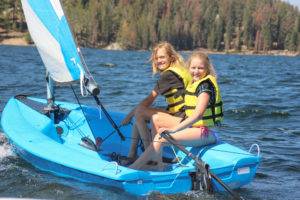 on water skis, and participate in a myriad of other activities. Many of these sports require time and practice to master. For first-time campers, two weeks is just enough time to expose them to all of the different activities and start practicing and improving skills. Returning campers continue to build upon and develop new skills, even after five or six years at our program. The depth of instruction offered, the opportunity to improve recreational skills, and the ability to earn different patches all distinguish Gold Arrow Camp’s program.
on water skis, and participate in a myriad of other activities. Many of these sports require time and practice to master. For first-time campers, two weeks is just enough time to expose them to all of the different activities and start practicing and improving skills. Returning campers continue to build upon and develop new skills, even after five or six years at our program. The depth of instruction offered, the opportunity to improve recreational skills, and the ability to earn different patches all distinguish Gold Arrow Camp’s program.
We have two outpost programs, away from our main camp, that take up a portion of the two-week session. We have a water sports outpost camp on an island on Shaver Lake where campers enjoy one or two nights camping on the beach. At Shaver Island, campers spend their days on the lake improving their skills in waterskiing, wakeboarding, and kneeboarding. While these sports are also done at our main camp on Huntington Lake, their stay at Shaver allows our two-week campers time to really improve their skills with a lot of “behind the boat” time. Our other outpost program is backpacking. All campers go on a one-night overnight backpacking trip and get to experience outdoor cooking, sleeping under the stars, and living in nature. There are some activities that we wait to do until the second week of camp, when campers are feeling connected and more comfortable taking risks.
Honestly, even two weeks seems short to us. We barely get campers to all of our activities, and it’s time for them to go home!
3. Social Skills Development
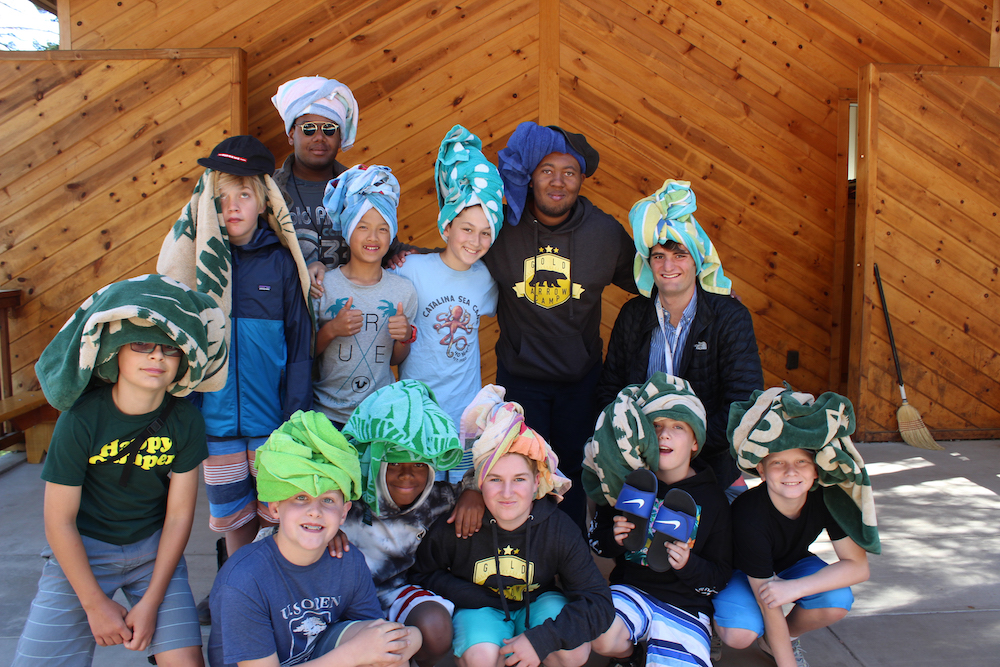
“Wonderful camp where my kids grew up and will have fond childhood memories. They both went from being scared and unsure their first summer, to loving camp at age 14 and wishing they could come back! I love the electronics-free policy – it is much needed, especially in this day and age, where kids and teens can enjoy the outdoors, making friends and having fun in the beautiful mountains!” – GAC Parent
Kids benefit from experiences living and working in groups regardless of the length of time. However, I believe that allowing a group to really bond and connect also allows kids to grow their communication, teamwork, and conflict resolution skills more than when they are in a shorter-term program.
4. Independence and Confidence Building
“My son had no idea what he was going to as he had never been to an out of town camp before let alone away from me for 2 whole weeks. When he returned, yes he was tired but he had the time of his life! He wrote me half way through his stay at GAC and told me “this place is magical and awesome!” I am hoping to be able to send him next year as well. What a great experience for my 8 yr old son!!!” -GAC Parent
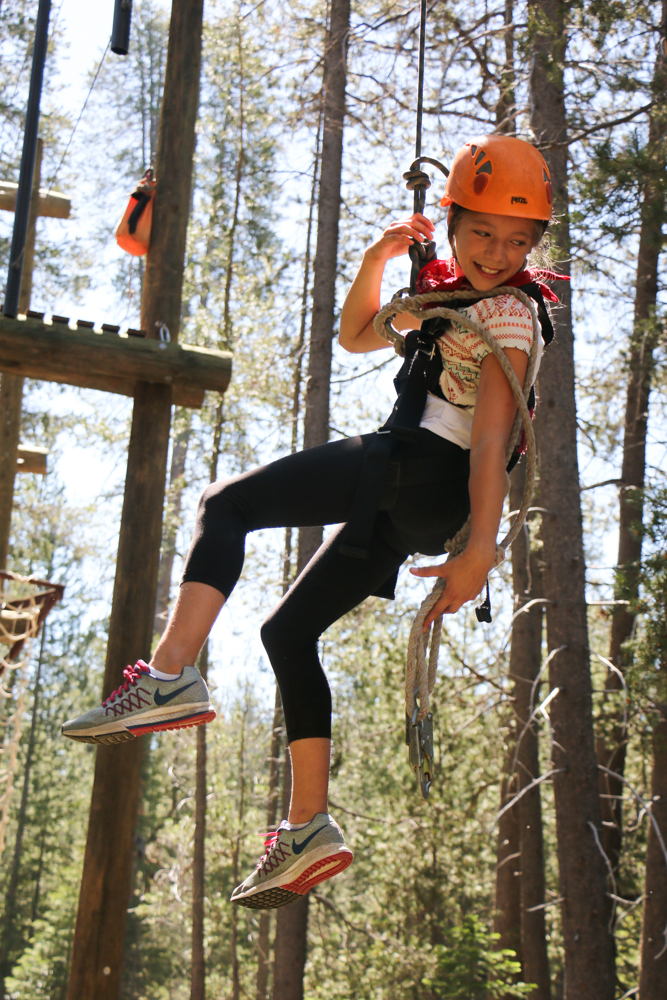 For many kids, their stay at camp is the first time that they have ever been away from their parents at all. Some have attended sleep-overs, weekend scout camps, or week-long school programs, but for many campers, their first stay at Gold Arrow is the longest they’ve been away from their parents. We know this, and our counselors are trained to help first-time campers get adjusted to being away and learn to cope with feelings of missing their parents.
For many kids, their stay at camp is the first time that they have ever been away from their parents at all. Some have attended sleep-overs, weekend scout camps, or week-long school programs, but for many campers, their first stay at Gold Arrow is the longest they’ve been away from their parents. We know this, and our counselors are trained to help first-time campers get adjusted to being away and learn to cope with feelings of missing their parents.
Campers feel a great sense of pride in themselves after “being on their own,” and having fun, without mom or dad nearby. While two weeks seem slow to parents, especially during their first camp experience, the days fly by at Camp.
“Our daughter always comes back from Gold Arrow the truest version of herself.” – GAC Parent
Squid & Foxtrot
Episode 65
In the triumphant return of the interview-based POG-Cast, Sunshine sits down with sister and brother Squid and Foxtrot to discuss what it’s like to come to camp and also to work with your sibling. Squid and Foxtrot were just one of the 18 sets of siblings we had on our camp staff this summer. You can see the other siblings at https://goldarrowcamp.com/gac-staff-siblings-2021/
Podcast: Play in new window | Download
Subscribe: Apple Podcasts | Spotify | Email | RSS
Want An Independent, Self-Confident Kid? Camp Can Help!
By Audrey “Sunshine” Monke, Camp Director. Originally published at Sunshine Parenting.
While it’s easy to think of ways to teach our kids to do laundry or solve math problems, finding a way to instill important character traits isn’t as simple. The way we model traits we want our children to exhibit has a powerful influence on them, and some traits (kindness, gratitude, and generosity) they learn first and foremost from parents.
But there are other traits best learned through experiences outside the home and beyond the watchful (sometimes too watchful) eyes of parents. Camp experiences offer exactly the kind of experience away from home where children grow important character traits like independence, self-confidence, and grit.
#1 Independence
“Looking back at my life, camp has been the most influential part of it. I can truly say camp is where I developed my independence, gained confidence, and learned what friendship truly means.”
-Lizz
Being hyper-involved and in constant communication with our children has become something modern parents brag about. But when do we start letting go and giving our kids a chance to feel independent? This has become much more challenging in an age where cell phones are always attached to our (and their) hips and tracking apps are ubiquitous. In fact, as parents today we tend to foster dependence even when we’re trying not to. Forgot their lunch? A friend says something mean? Stubbed their toe? We know right away and swoop in to help.
Whether the result of parenting trends or ultra-high levels of physical and digital connectedness, today’s children are much less independent than we were at the same age. I find it hard to resist editing my son’s paper to make it “just a little bit better” or jumping in to help make his lunch when he’s running late for school. Thirty years ago, we were babysitting infants at age 13. Today, some of us hire babysitters for our 13-year-olds!
Camp experiences offer unique opportunities for kids to see how much they can do without us hovering nearby. They build their independence skills because they take more responsibility for themselves and their belongings, make their own decisions, and feel a sense of autonomy. For many kids, camp is the first opportunity they’ve had to experience these things.
#2 Self-Confidence
“Camp has really helped me become more confident with who I am and has helped me try new things. Without camp, I would be too shy to go up to someone and introduce myself. Camp has had a giant impact on my personality, and without it I would be a completely different person.”
-Stephanie
When we tell our kid she’s “great” at something, it’s easy for her to be wary of the praise. We parents are notorious for seeing our kids through rose-colored lenses and thinking they are the greatest at _______ (fill in the blank); our kids know intuitively that our assessment of them, however complimentary, is most likely not accurate or objective.
However, when another respected adult mentor – like a camp counselor! – recognizes a positive trait in our child and points it out, that can have a powerful impact. When someone outside the immediate family recognizes our child’s unique qualities and helps him or her address weaknesses, it can build real self-confidence.
#3 Grit
“I love the encouragement that I got, both from counselors and campers, to try new things all the time. I love that the camp encourages you to do that. The camp atmosphere made me stand out and be unique, in ways that I would have been too embarrassed to try at home.”
-Claire
“Grit” became the new buzzword in education and parenting circles thanks to Paul Tough’s best-selling book, How Children Succeed. Angela Duckworth further cemented the importance of grit, or resilience, in her popular TED talk: Grit, the Power of Passion and Perseverance, and her book, Grit. People with grit have “stick-to-itiveness,” persistence, and resilience, all of which help them work hard and push past difficulties and failures.
We all need some grit. But how do we teach grit to a distinctively non-gritty kid or young adult—one who quits when something gets challenging, who doesn’t want to try anything new or difficult, or who prefers playing endless video games to practicing piano, reading, or some other more useful-seeming skill?
As parents, it’s hard to create experiences that require our children to use grit, but at camp those experiences happen every day. While struggling to climb the rock wall or attempting to get up on water skis for the 12th time, our kids develop their grit muscles in a big way at camp. And, they likely wouldn’t try for as long or as hard if we parents were hovering nearby with our worried expressions. At camp, kids are encouraged to set goals, challenge themselves, and overcome failure again and again. And that develops their grit.
Interrupting the cycle of dependence can only happen when we as parents are willing to encourage our children to develop their independence, self-confidence, and grit, and, though it may seem counter-intuitive, that happens best when we’re not around.
Related/Resources:
Angela Duckworth’s TED Talk: Grit, the Power of Passion and Perseverance
How Children Succeed: Grit, Curiosity, and the Hidden Power of Character, Paul Tough
10 Reasons Great Parents Choose Summer Camp
Too Much Screen Time? 4 Ways Summer Camp Can Help
How Camp Teaches 21st Century Skills
“A profound gap exists between the knowledge and skills most students learn in school and the knowledge and skills they need for success in their communities and workplaces.”
-Partnership for 21st Century Skills
“Having started at Gold Arrow as a little seven year old, I have grown up here. Camp has become my home away from home, and I can honestly say it has shaped who I am today. It has given me confidence and taught me skills far beyond learning how to wakeboard or horseback ride. I am comfortable with myself, I am patient, and I have learned how to become a leader.”
-Katie “Rascal” Baral, 10 year Camper
Parents, educators, and youth development professionals are well-versed in the phrase “21st Century Skills.” The phrase encompasses our current understanding of the urgent need for our children to be learning more than how to read, write, and do math. There are many other skills needed to grow into productive, successful adults. As I look at the list of 21st Century Skills, I am struck by how many of the skills are intentionally modeled and taught at camp. Following are five specific 21st Century skills that children learn at camp:
Working Creatively with Others
Campers learn to work creatively with others through working towards goals with their cabin group. Even something as simple as collaborating on a skit, song, or dance requires being open and responsive to different perspectives and incorporating group input. An important aspect of creativity and innovation is being able to “view failure as an opportunity to learn.” At camp, with every new and challenging activity, campers are encouraged to challenge themselves and persevere past failure. They learn that “creativity and innovation is a long-term, cyclical process of small successes and frequent mistakes.”
Communication
From the moment they arrive at camp, campers have the opportunity to practice and hone their communication skills. Gathered around the campfire on the first evening, campers talk about themselves in front of their small cabin group. They also listen to others share about themselves. At meals, campfires, and while walking around camp and participating in activities, counselors guide discussions about deeper issues and make sure all campers participate, even those who are less outgoing. Listening skills are addressed and enhanced through practice. Without the distractions and escape of technology, campers practice articulating thoughts and ideas and listening to the ideas of others throughout their time at camp.
Collaboration
When working together at Team Building, during cabin clean up, or while preparing for a performance, campers learn important collaboration skills. They learn that they need to be flexible. They often learn another important collaboration skills, which is that it is often necessary to make compromises to accomplish a goal. Counselors encourage campers to share responsibility for tasks and work together. Campers are also encouraged to value and acknowledge each individual contribution made by team members.
Social and Cross-Cultural Skills
Learning to interact effectively with others is an important social skill that doesn’t come naturally to all people. At camp, counselors guide campers to learn when it is appropriate to listen and when it is appropriate to speak. Counselors also require that campers respectfully listen to others’ opinions and treat others with respect.
For many campers, their time at camp is their first opportunity to meet and live with people from other cultures. Camp offers the opportunity for kids to form friendships with staff and campers from other countries. Camp provides the opportunity for campers to gain a respect for and work effectively with people from a range of cultural backgrounds. On International Day each session, we celebrate and learn about our international campers and staff.
Leadership and Responsibility
Guiding and leading others is an important 21st Century skill. In campers’ early years at camp, they learn basic responsibility for themselves and those around them. Even our youngest campers have the opportunity to lead others in a song or game. As they get older, campers gain more of an understanding of how their words and actions influence others, and they learn how to positively use their leadership skills.
While academics are important, children need other skills to be successful. Camp offers an ideal setting for campers to learn and enhance many of the non-academic 21st Century Skills. One line of our camp song says, “I sure did learn much more here than I ever did at school.” And, when learning is viewed as more global than the subjects listed on the report card, that is an incredibly profound and true statement.
Read about all of the 21st Century Skills at www.p21.org.
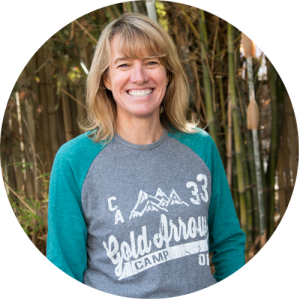
Audrey “Sunshine” Monke, MA, has been the owner of Gold Arrow Camp since 1989 and currently serves as the Chief Visionary Officer. In addition to her vision-casting and mentoring at GAC, Sunshine is an author (Happy Campers: 9 Summer Camp Secrets for Raising Kids Who Become Thriving Adults), podcast host, speaker and coach on the topics of parenting, social skills, and happiness. Find out more at her website, Sunshine Parenting.
Visit Sunshine Parenting for more summer camp-related posts & podcast episodes.
Bears’ Adventure
A kid today can likely tell you about the Amazon rain forest – but not about the last time he or she explored the woods in solitude, or lay in a field listening to the wind and watching the clouds move.
-Richard Louv, Last Child in the Woods
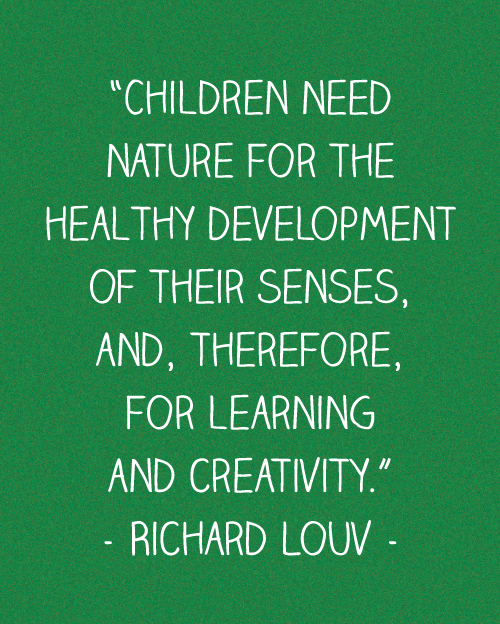 At GAC, “getting outside to experience the awe of nature” is one of our core values. Many of our campers, who primarily live in cities or suburbs, have never had the opportunity to live in and experience nature up close. The rustic set-up of our living areas, which are large tents on wood platforms, allows campers the feeling of being close to nature throughout their stay at camp. With no electricity (and the distractions inherent with being plugged into technology), campers truly get to experience living outdoors. From their tents, campers can hear birds chirping, the water running in the creek, and the breeze rustling the tree branches. Evenings include relaxing chats and stories around the campfire while the sun sets and the stars come out overhead.
At GAC, “getting outside to experience the awe of nature” is one of our core values. Many of our campers, who primarily live in cities or suburbs, have never had the opportunity to live in and experience nature up close. The rustic set-up of our living areas, which are large tents on wood platforms, allows campers the feeling of being close to nature throughout their stay at camp. With no electricity (and the distractions inherent with being plugged into technology), campers truly get to experience living outdoors. From their tents, campers can hear birds chirping, the water running in the creek, and the breeze rustling the tree branches. Evenings include relaxing chats and stories around the campfire while the sun sets and the stars come out overhead.
Campers experience the wonder of nature from the moment they arrive at camp, but there’s just nothing quite like being really far from “civilization” and even further out into nature. Because we’ve experienced how life-changing it is for campers, getting our campers even deeper into the woods is also a priority. With even fewer distractions than what they experience at main camp, our backpacking program serves the purpose of getting our campers completely immersed in nature. For campers who have completed 4th-5th grades (our “Tigers” age group), their cabin group is scheduled for a one-night overnight backpacking trip. Campers get to experience exploring, sleeping, cooking, and living in an even more rustic setting than their camp tent home. I wrote about one of these magical Tigers’ backpacking trips in my post, “Nature Pees and Lanyard Fishing Poles.” Our older campers, the Lions and Eagles (who’ve completed 6th-9thgrades), have the option of signing up for a backpacking trip, one of the most popular choice options for their free choice days.
But a highlight of the two-week session for our youngest campers (grades K-3), and their version of “backpacking,” is Bears’ Adventure. This one-night trip allows campers to experience sleeping outdoors under the stars and cooking over a campfire. Campers’ luggage is taken for them to the campsite, so they are not technically “backpacking,” because they have no pack to carry. With just their water bottle and their positive attitudes, they set out from camp singing and talking on their hike. Once they get to their destination, which feels far from camp (although it is less than a mile away), they are rewarded with a spectacular view of Huntington Lake and the surrounding wilderness area. They truly get the feeling that they have been on a long, adventurous hike.
The best part of Bears’ Adventure is the free time kids get to play and explore the area. For many campers, the longer sticks provide the perfect start to a fort. Others enjoy laying on their sleeping bags talking with friends or silently watching clouds move overhead. Some participate in crafts and games while enjoying being outdoors. For many of these kids, Bears’ Adventure is their first experience “roughing it,” and they absolutely love it.
When they hike back into camp the morning after their Adventure, our Bears’ campers stand a little taller. And their dirty, smiling faces are the best indication that they have experienced the awe of nature.
Leaving No Trace at GAC
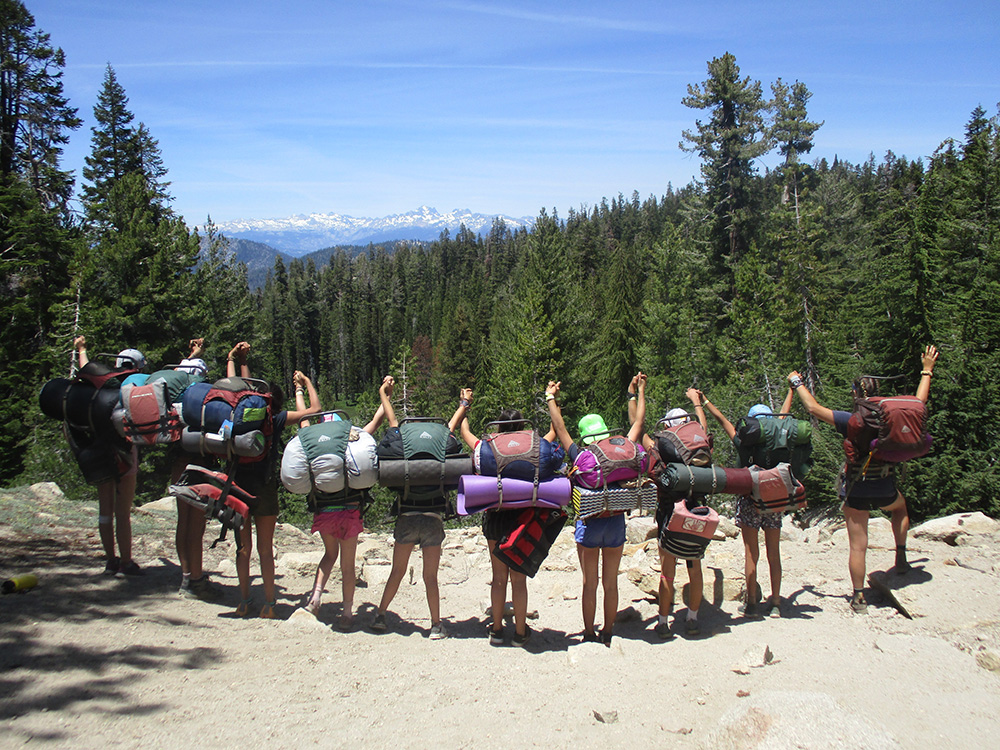 Here at GAC, we believe that camp leaves a lasting impact on everyone who experiences it. However, in our backpacking and nature programs, we’ve been working hard to have a smaller impact. Not on campers, but on the environment we camp in! This year is our fifth summer working with the Leave No Trace Center For Outdoor Ethics to become a Leave No Trace Accredited Youth Program. With the guidance of the LNT’s 7 principles, we’ve been making a conscious effort to decrease our impact on nature even as we send more campers into the beauty of the High Sierra!
Here at GAC, we believe that camp leaves a lasting impact on everyone who experiences it. However, in our backpacking and nature programs, we’ve been working hard to have a smaller impact. Not on campers, but on the environment we camp in! This year is our fifth summer working with the Leave No Trace Center For Outdoor Ethics to become a Leave No Trace Accredited Youth Program. With the guidance of the LNT’s 7 principles, we’ve been making a conscious effort to decrease our impact on nature even as we send more campers into the beauty of the High Sierra!
One of our core values is that we want campers to “experience the awe of nature.” All of our campers have an opportunity to experience nature outside of our traditional camp property. Our youngest campers have an overnight of tent camping (we take care of moving their luggage) that we call Bears’ Adventure. Our middle campers spend one night underneath the stars on a backpacking trip into the Kaiser Wilderness of the Sierra National Forest as a part of our backpacking program. Our oldest campers are given the opportunity to sign up for a backpacking trip, and many do. We even offer a special program, the Outdoor Leadership Course, for teens who want a more immersive experience in the backcountry. All of these programs adhere to The 7 Principles of Leave No Trace:
- Plan Ahead and Prepare
- Our trips are planned well in advance and led by certified instructors. They are well versed in how to lead trips with minimal impact on nature.
- Travel & Camp on Durable Surfaces
- We use well-established trails and sleep on durable surfaces. We are happy to be able to utilize the established trails and camping sites in the national forest.
- Dispose of Waste Properly
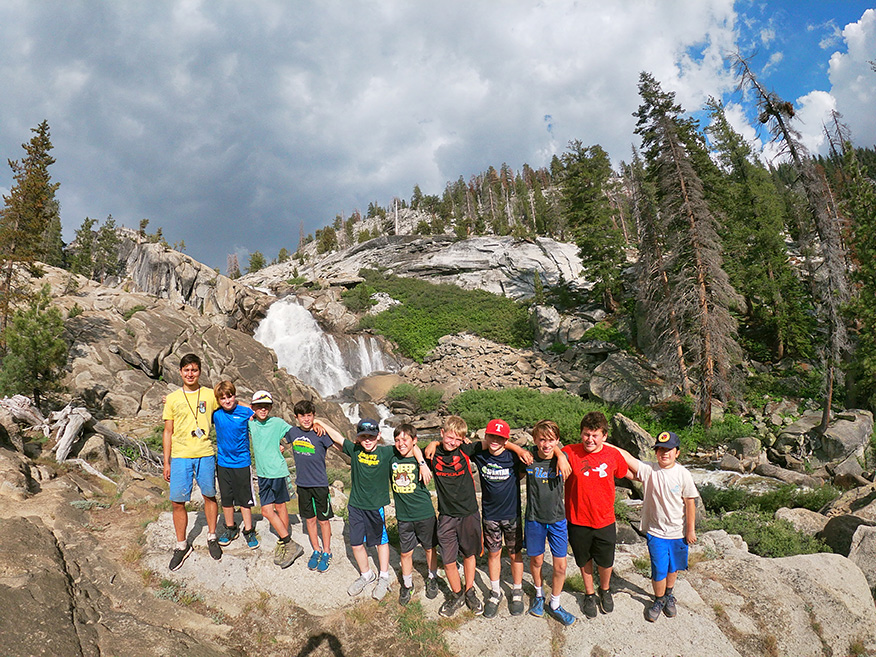
- Our backpacking trips offer the opportunity for campers to “nature pee,” which is an experience fewer and fewer children have today. The trips also offer the opportunity to learn why it’s important that we do not use toilet paper in the wilderness, and that if TP is necessary, we’ll pack it back to camp for proper disposal.
- Leave What You Find
- It is tempting to bring home a giant pinecone as a souvenir, but our counselors remind campers to “leave only footprints, and take only photographs.” Our campers bring home plenty of photographs (and other memories).
- Minimize Campfire Impacts
- Campfires are an important part of our program, and we work hard to minimize their impact on the backcountry by using established fire sites and keeping the fires small.
- Respect Wildlife
- We love to see wildlife on a trip, but we know that the forest is their home. That’s why campers and staff never approach wildlife. Instead, they experience wildlife at a distance, in its natural habitat.
- We also respect wildlife by making sure that we aren’t tempting them with food. In camp, we don’t allow food (or even food trash) off of the Dining Porch. On the trail, every bit of food and food trash stays in a “Bear Canister” to prevent us from becoming attractive to forest friends who would like to share our dinners!
- Be Considerate of Other Visitors
-
- We’re thrilled when other people get to share our backyard! We’re friendly on the trail, but also make sure we respect their space and their desire to be in nature as well.
-
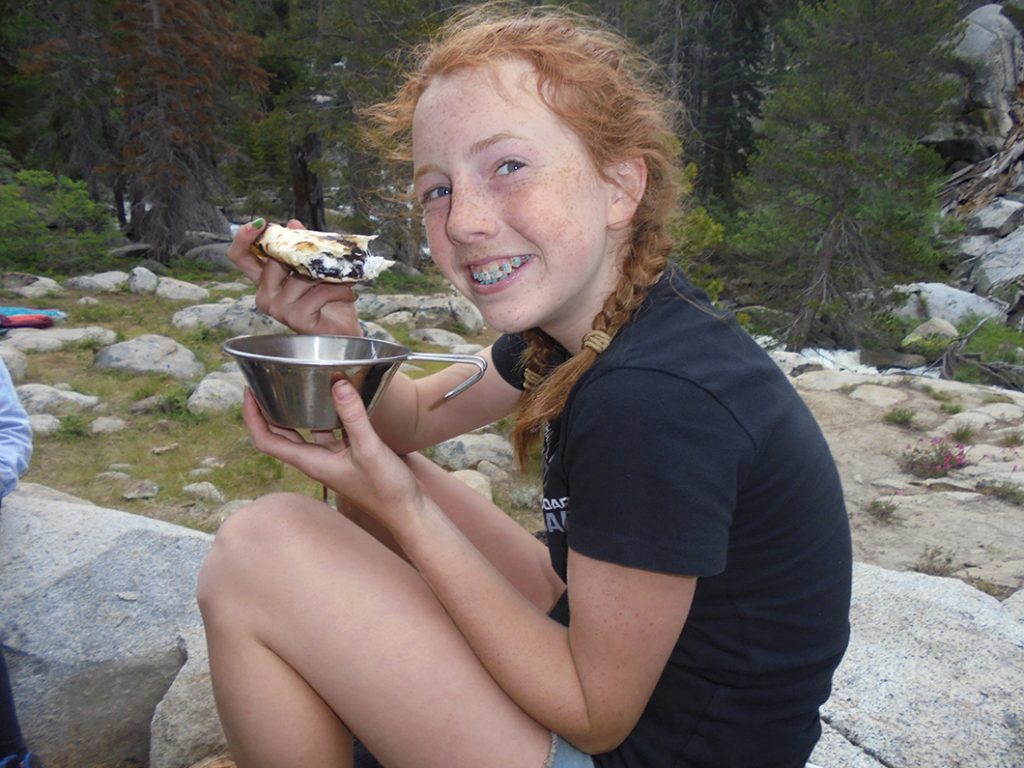
When campers are introduced to their program, the backpacking counselors review the LNT 7 principles as a part of the safety discussion before any trip departs. We even have a banner that hangs on our backpacking shed so that they can read along!
The backpacking counselors also lead two different types of programs in camp, called nature and OREO (Outdoor Recreation Educational Opportunity). The goal of OREO is to teach campers to appreciate nature while spending some time out of camp on a day hike and bonding with their cabin group. At the end of the hike, there’s even a reward that shares its name with the acronym OREO!
The goal of the nature program is to support GAC’s core value of experiencing the awe of nature and let campers play games to connect them to nature. We know that exposing campers to the beauty of nature will help them develop a personal connection and want to protect it for future generations.
Since 2017, we have been close partners with the Leave No Trace (LNT) Program and have educated our campers on the 7 LNT principles before every backpacking trip and OREO hike. We are dedicated to minimizing our impact on the Sierra Nevada and helping our campers understand WHY it is important, both for nature and for future generations. We hope that if you head out for some adventures in nature you and your family can also minimize your impact!
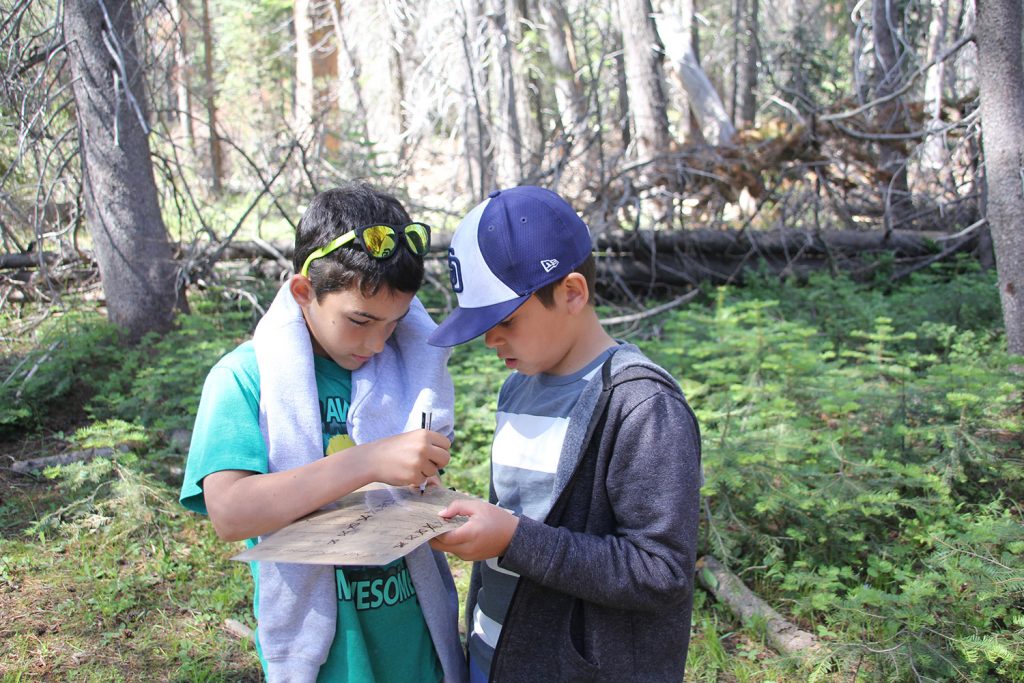
The Importance of Cabin Group Activities
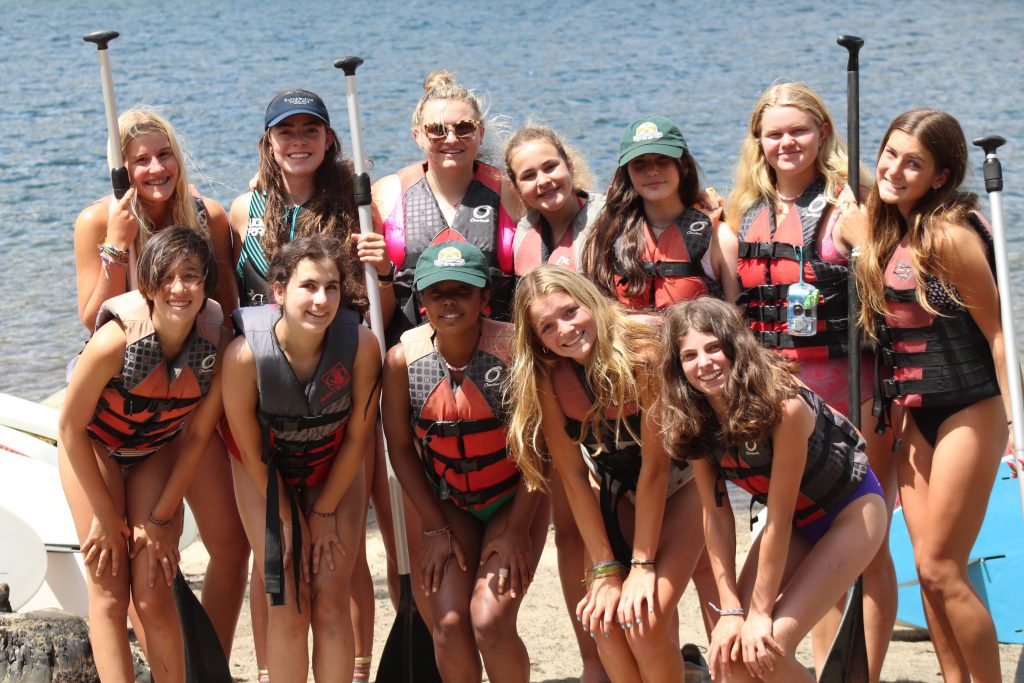
By Alison “Bean” Moeschberger
The program at Gold Arrow has been designed to provide campers with a variety of experiences and opportunities while they are at camp. Rather than focusing on skill progression in one area, we feel it is important for campers to be introduced to activities they may not have chosen to do on their own. We strive to create a supportive and encouraging environment in which campers feel comfortable pushing their own boundaries and can learn about themselves as they conquer fears, face challenges, and live in community with others.
Cabin groups are scheduled to participate in activities together for two of the three activity periods each day. During cabin activities, the Group Counselor plays a key role in fostering personal growth in campers. These specialized 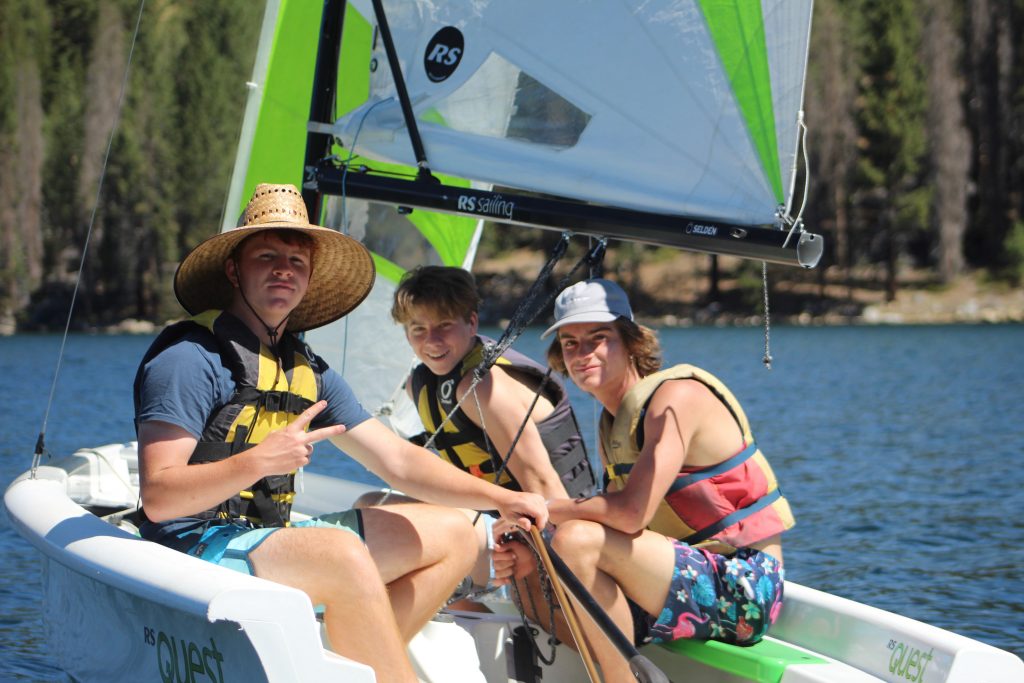 counselors attend activities with the cabin group and help campers set personal and group goals and hold the group accountable for reaching their goals and encouraging others. Participating in activities as a cabin group allows campers to take risks and push themselves in a safe, supportive environment. Through watching cabin mates overcome fears and accept new challenges, campers learn resilience and empathy. Everyone’s role in the group is necessary, and the Group Counselor serves to build and enhance the supportive community so that the cabin group feels like a family.
counselors attend activities with the cabin group and help campers set personal and group goals and hold the group accountable for reaching their goals and encouraging others. Participating in activities as a cabin group allows campers to take risks and push themselves in a safe, supportive environment. Through watching cabin mates overcome fears and accept new challenges, campers learn resilience and empathy. Everyone’s role in the group is necessary, and the Group Counselor serves to build and enhance the supportive community so that the cabin group feels like a family.
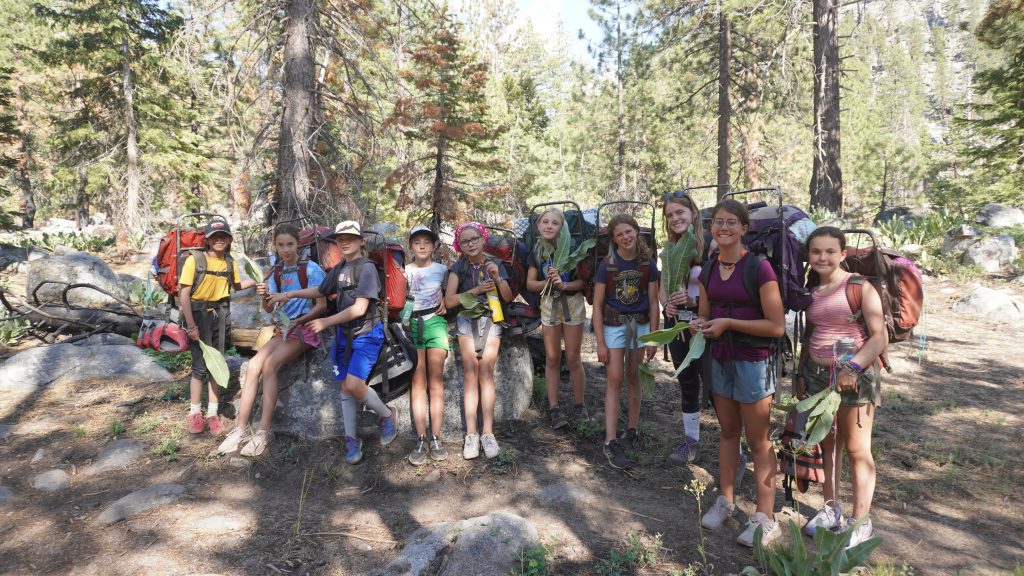
The third activity period of the day, called “Free Time,” gives campers an opportunity to sign up for activities as individuals. Campers can try special activities that are only offered during this period or return to an activity they enjoyed with their cabin group.
You can find out more information on activities offered at Gold Arrow Camp here.
The Magic of The Campfire
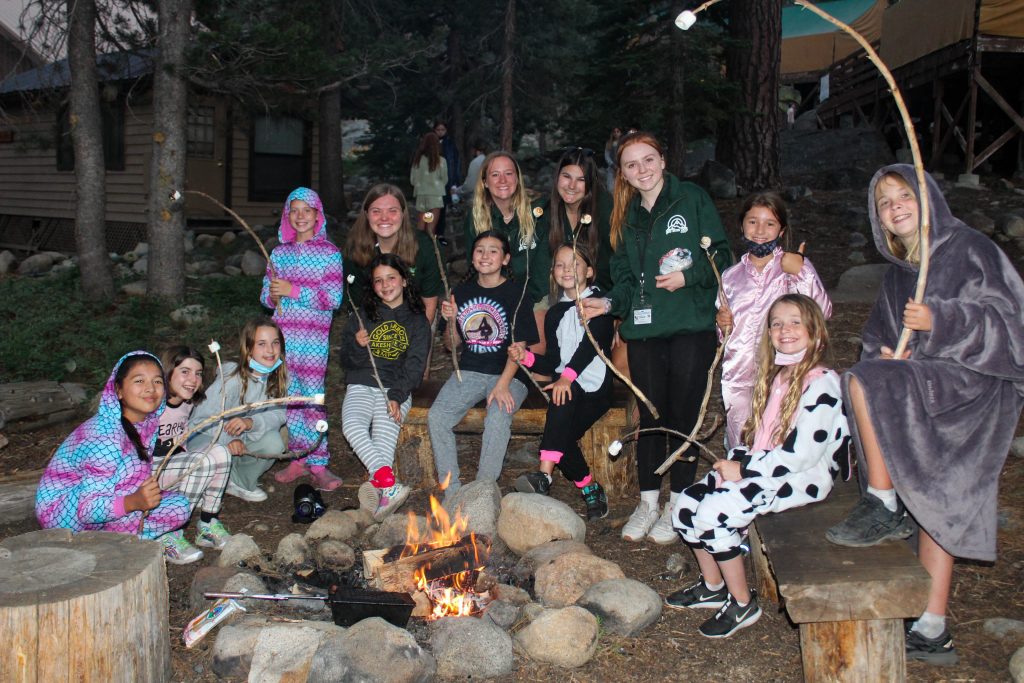
by Andy “Soy” Moeschberger
My single favorite time of day at camp is campfire. Every night each of our 31 cabins has its own campfire unless the cabin is at a social (a campfire with another cabin) or our dance. Why do I love this time of day so much? In part because I love the smell of woodsmoke. In part because it means the day is winding down and I’ll be in bed within the next 3 hours. But mostly because of the magic.
What could be so magical about a campfire? Some logs, some pine needles, a match, and some popcorn. That’s simple and fun, but it isn’t magic.
I beg to differ. I think that the time spent around a campfire is magic. It’s transformational and powerful in the way that nothing else I have experienced in my life is. When a group of 10 friends is gathered around the flickering flames under a blanket of stars they can and will share truths that are more lasting and meaningful than if they were in a game room or around a dining room table.
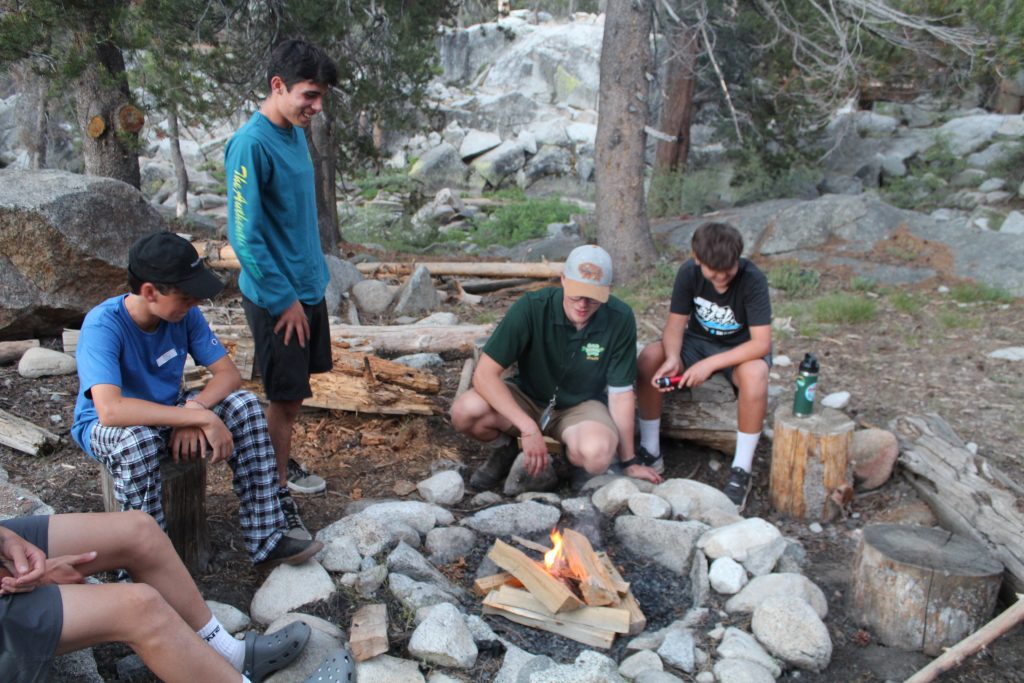
But why? What is it about the campfire that makes this possible? Well, maybe it isn’t magic. Maybe it’s science. According to a study from the University of Alabama, adults who were exposed to a “fire with sound condition” (a video of a fire with the sound turned on) showed lower blood pressure and increased “prosocial” behaviors (such as smiling, making eye contact and engaging in conversation). And that was a VIDEO of a campfire with an adult by themselves! The authors hypothesize that this is an evolutionary development. They believe that for ancient humans the fire provided warmth and a way to cook, and also signaled the safety of numbers. Our ancient forerunners knew that by being around the campfire they could relax. Even a millennium after we moved indoors, our minds still subconsciously know that a fire is a place where we are safe.
Children need this more than ever today. The pressures of the world increasingly weigh on young people. If they can have an opportunity to feel, like the cavemen of old, relaxed and safe, then they can begin to become their best selves. The campfire is a natural way to do that. As I tell our graduating campers at their Paddle Ceremony, the most meaningful moments of their camp careers probably occurred around a campfire.
Many camps have only occasional campfires, or “flashlight” fires. While there are benefits to that, we know the nightly practice of an actual campfire is important. Our counselors are trained specifically on campfires. The training is far more than how to stack the logs and what the ideal marshmallow looks like. Indeed, they practice in our training how to lead a meaningful discussion around the fire. They lead campers in sharing their highs and lows of the day. They help to facilitate discussions about real life topics that campers are interested in or struggling with.
On our last night of camp, we gather for an all-camp campfire that we call Appreciation Campfire. There are songs and stories and skits. Off to the side of our amphitheater (which we call Big Campfire!), there is a campfire pit, where the logs crackle away merrily. As the night winds down, the flames grow lower and lower. At the end of the night, counselors share their appreciation for their cabins by candlelight as the last embers of the campfire glow.
That’s just a last tiny piece of magic before we go home.
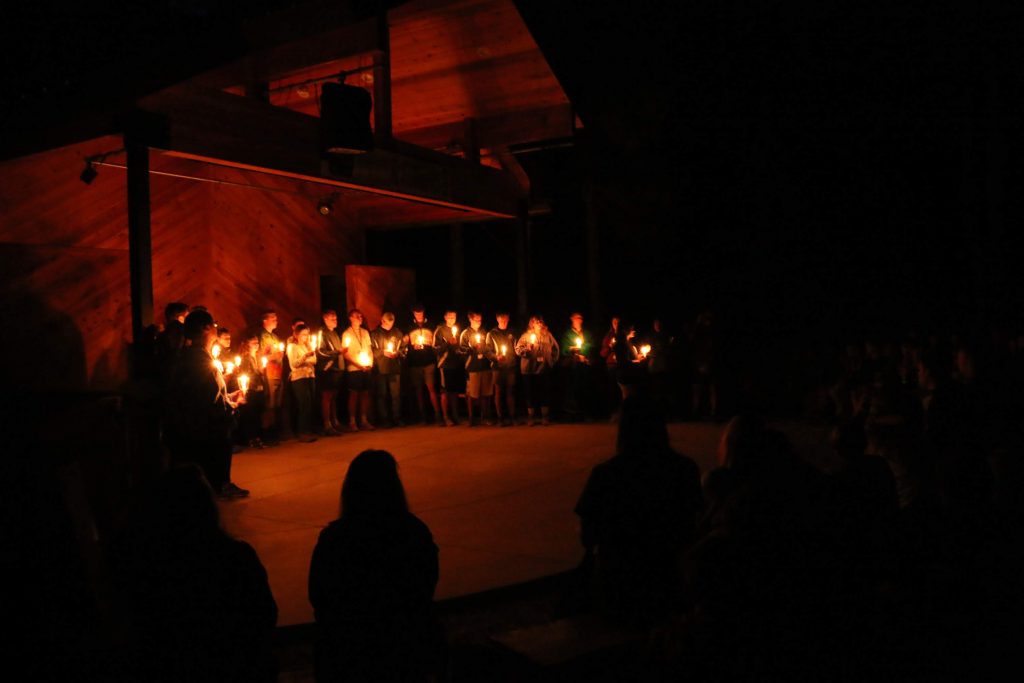
Echo
Episode 64
Soy is joined by a woman who talked her mom into sending her to camp at age 6 and has been coming ever since! Echo came to camp on the shirttails of her older sister Nox and has learned everything from independence to how much she loves being unplugged in nature.
Podcast: Play in new window | Download
Subscribe: Apple Podcasts | Spotify | Email | RSS

